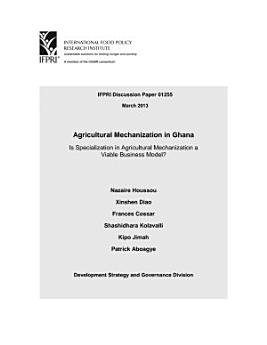Agricultural Mechanization in Ghana: Is Specialization in Agricultural Mechanization a Viable Business Model?
Nazaire Houssou · Xinshen Diao · Frances Cossar · Shashidhara Kolavalli · Kipo Jimah · Patrick Aboagye
mars 2013 · IFPRI Discussion Paper Bok 1 · Intl Food Policy Res Inst
5,0star
3 recensionerreport
E-bok
24
Sidor
family_home
Kvalificerad
info
reportBetyg och recensioner verifieras inte Läs mer
Om den här e-boken
Since 2007, the government of Ghana has been providing subsidized agricultural machines to private enterprises established as Agricultural Mechanization Services Enterprise Centers (AMSEC) to scale up tractor-hire services to smallholder farmers. Although farmers demand for mechanization has increased in recent years, most of this demand concentrates on land preparation (plowing) service. Using the firm investment model and recent data, this paper quantitatively assesses whether AMSEC as a private enterprise is a viable business model attractive to private investors. Even though the intention of the government is to promote private sector-led mechanization, findings suggest that the AMSEC model is unlikely to be a profitable business model attractive to private investors even with the current level of subsidy. The low tractor utilization rate as a result of low operational scale is the most important constraint to the intertemporal profitability of tractor-hire services. Our findings further support the argument of Pingali, Bigot, and Binswanger (1987), who indicated that mechanization service centers supported through governments heavy subsidy are not a policy option anywhere in the world, even in the current situation in Ghana. Although the tractor rental service market is a proper way of mechanizing agriculture in a smallholder-dominated agricultural economy such as Ghana, this paper concludes that the development of such a market depends crucially on a number of factors, including increased tractor use through migration across the two very different rainfall zones (north and south), increased tractor use through multiple tasks, and use of low-cost tractors. The government can play an important role in facilitating the development of a tractor service market; however, the successful development of such a market depends on the incentive and innovation of the private sector, including farmers who want to own tractors as part of their business portfolio, traders who know how to bring in affordable tractors and expand the market, and manufacturers in exporting countries who want to seek a long-term potential market opportunity in Ghana and in other west African countries.
Betyg och recensioner
5,0
3 recensioner
Betygsätt e-boken
Berätta vad du tycker.
Läsinformation
Smartphones och surfplattor
Installera appen Google Play Böcker för Android och iPad/iPhone. Appen synkroniseras automatiskt med ditt konto så att du kan läsa online eller offline var du än befinner dig.
Laptops och stationära datorer
Du kan lyssna på ljudböcker som du har köpt på Google Play via webbläsaren på datorn.
Läsplattor och andra enheter
Om du vill läsa boken på enheter med e-bläck, till exempel Kobo-läsplattor, måste du ladda ned en fil och överföra den till enheten. Följ anvisningarna i hjälpcentret om du vill överföra filerna till en kompatibel läsplatta.








